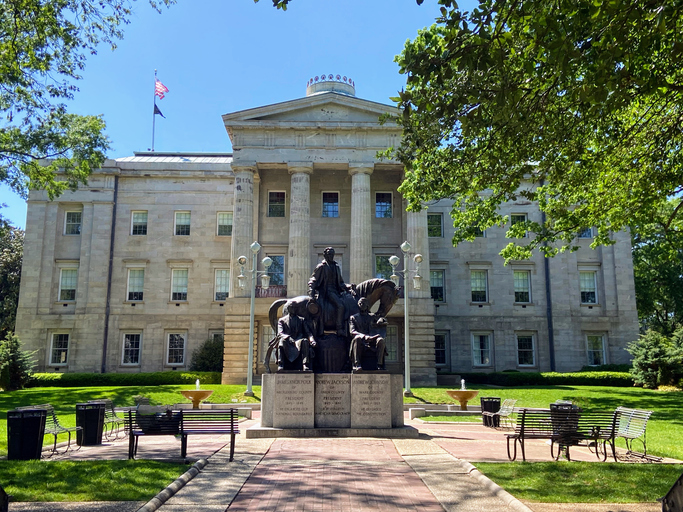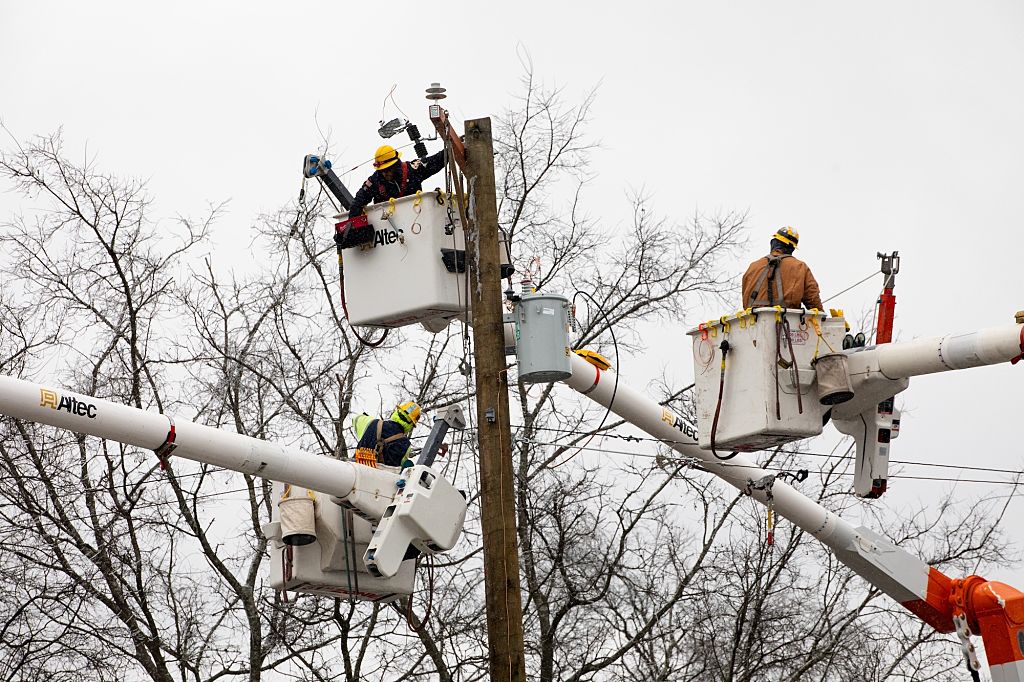North Carolina's Allegedly Racist Voting Map Goes To Trial
Op-Ed: As Trial Over North Carolina’s Allegedly Racist Voting Map Begins, Remember Racist Redistricting Is GOP Strategy

North Carolina is the latest of several red states where Republican lawmakers are in legal battles after being accused of redistricting their congressional maps in order to dilute Black voting power — because the party that keeps bloviating about the need for added election security to protect America from largely fictional election fraud just can’t stop being the thing it pretends to be afraid of.
According to the Associated Press, a trial scheduled by a three-judge panel will start Monday in Winston-Salem to determine whether NC’s GOP violated federal law and the U.S. Constitution when they enacted new electoral maps in October 2023. Like other GOP lawmakers across the country, state Republicans in N.C. are claiming their new map is lawful and partisan, and that race was not considered in their decision-making. Calling it “partisan” is laughable enough, considering the new map provably gave Republicans a clear advantage, but they’re expecting us to also believe that the new map only disadvantaged Black voters as a matter of happenstance, not intent.
From AP:
The lines were used in the 2024 elections, after which Republicans kept General Assembly majorities and flipped three U.S. House seats held by Democratic incumbents who didn’t seek reelection because they decided the recast district made winning impossible. Those seat flips, which turned a 7-7 delegation into one with a 10-4 Republican advantage, helped the GOP keep narrow control of the House, which has helped advance President Donald Trump’s agenda.
Favorable rulings for the plaintiffs could force Republicans to redraw maps for the 2026 elections, making it harder to retain their partisan advantage. Otherwise, the districts could be used through the 2030 elections.
The trial involves two lawsuits filed in late 2023.
In one lawsuit, the North Carolina NAACP, Common Cause and several Black residents originally sued over redrawn state House and Senate maps and U.S. House districts. The other lawsuit filed by nearly 20 Black and Latino voters focused on the new congressional districts, four of which they argue are illegal racial gerrymanders.
Plaintiffs in both lawsuits claim the new map was drawn so deliberately in Republicans’ favor that it made it impossible for Black voters to elect their preferred candidate, violating the Voting Rights Act by consolidating or breaking up predominantly Black voting districts, which have historically elected Democratic leaders.
In a perfect political world, it would be illegal for legislators of either party to tamper with voting maps just to give their party an advantage. It’s ironic that the party that vehemently opposes diversity, equity and inclusion initiatives would change things up to give themselves a political bump instead of allowing their elections to be merit-based. But, again, this is all par for the Republican course.
Here’s what I wrote about it last year before President Donald Trump was elected for a second term:
At this point, it should be clear as day to anyone paying attention that part of the GOP’s strategy to win big in November is to dismantle predominantly Black voting districts purportedly in the name of “race-neutrality” while increasing the number of predominantly white districts with no sudden concern for racial neutrality whatsoever. It’s a strategy that has already worked in Florida and Louisiana, and it’s currently being mulled over by judges in Texas. Now, South Carolina is the latest winning contestant in Who Wants to Make a Jim Crow Voting Map Legal? as the U.S. Supreme Court has upheld a congressional map in the state that a lower court ruled was an unconstitutional racial gerrymander that resulted in the “bleaching of African American voters” from a district.
It’s the same old story that resulted in victories in South Carolina and the aforementioned red states, as well as contested cases in Alabama and Georgia: Lower courts ruled that state Republicans purposely diluted Black voting power by breaking up Black districts, and so the gerrymandering GOP goons keep appealing to court after court until they find one that is conservative enough to decide their actions haven’t been proven racist just because it only negatively affects Black voters.
“We start with a presumption that the legislature acted in good faith,” Justice Alito wrote in his decision. “When a federal court finds that race drove a legislature’s districting decisions, it is declaring that the legislature engaged in ‘offensive and demeaning’ conduct that ‘bears an uncomfortable resemblance to political apartheid.’ We should not be quick to hurl such accusations at the political branches.”
In other words: If the demonstrably racist lawmakers say they didn’t do anything racist then they didn’t do anything racist.
The thing is, even when these Republican legislators lose in court, it’s an uphill battle to get them to comply with court rulings. Recently, a federal judge ruled that Louisiana’s current voting map violates the Voting Rights Act by only having one predominantly Black district, even though Black people make up a third of the state’s population. Yet state Republicans, earlier this month, rejected a new map that would’ve included eight new, majority Black districts. In Alabama, a federal court once again ruled that state Republicans “engaged in intentional discrimination when it refused to draw a congressional plan with a second Black majority district after courts, including the Supreme Court, repeatedly rejected maps with just one such district,” CNN reported. But GOP leaders have fought court orders to draw a second predominantly Black voting district for years.
So, now we wait to see how things shake out in N.C. Either way, though, the Republican strategy should be clear to anyone paying attention: deny the existence of systemic racism while relying on systemic racism to Make America Great Again.
SEE ALSO:
Trump Denies Hurricane Relief To North Carolina Amid Drastic Changes To FEMA
Grassroots Gumption: How Rural Voices Have Changed North Carolina’s Ground Game








